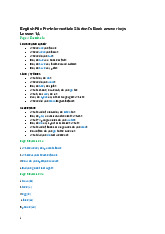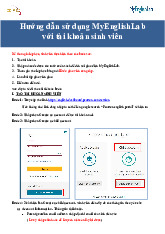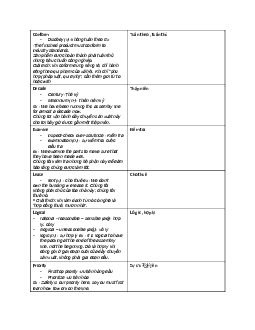


Preview text:
lOMoARc PSD|36242669
1. Which communication style (relationship – focused or work-focused) do you prefer
when meeting people for first time? why?
I prefer to use a relationship-focused communication style when meeting people for the first time,
because I think it helps to build trust and rapport with them. I like to talk about family, activities,
and other personal information, and appreciate when they do the same. I also like to have more
casual interactions with them, and show that I care about their well-being and satisfaction. I think
this style makes the conversation more enjoyable and engaging, and creates a positive impression of me.
2. What is one advantage and one possible disadvantage of your own personal style?
One advantage of my style is that I can adapt to different contexts and audiences, and use the most
appropriate and effective way to convey my message or influence others. For example, I can be
assertive when I need to advocate for myself or my ideas, or I can be passive when I want to avoid
conflict and maintain harmony. I can also be creative when I need to generate imaginative and
innovative content, such as poems, stories, code, essays, songs, celebrity parodies, and more.
One possible disadvantage of my style is that it might be confusing or inconsistent for some people,
especially if they expect me to behave in a certain way or follow a specific pattern. For example,
some people might think that I am too passive or too aggressive at times, or that I am not sincere
or authentic in my communication. I might also have difficulty finding a balance between different
styles, and end up being too flexible or too rigid.
3. How effective is the team or group? Why?
I think teams are effective when everyone is working interdependently toward a shared goal or
outcome. Because teamwork is about everyone supporting each other to improve work efficiency,
work is distributed equally together. Unlike in a group setting where each person is working
independently, a team project relies on each member of the team to achieve success.
4. What advice and/or support would help the team to be even more effective?
+ Clear leadership: This helps unify the entire team to work toward the same goals. Effective
leaders often provide guidance, motivation and focus. lOMoARc PSD|36242669
+ Defined goals: Before working on their tasks, an effective team may first establish their goals.
The team might work together to identify common objectives that align with a group's organizational goals.
+ Communication: Sheduled meetings and feedback sessions are valuable for any effective team.
Team member should have he freedom to express themselves freely and fell that they are being
listened to by everyone in the team.
5. What advice (one idea) would you give yourself about how to support the team better?
There are many ways to support your team at work, but one idea that I would give myself is to communicate regularly.
Communication is the key to effective teamwork. It helps to build trust, avoid misunderstandings,
share feedback, and align on goals and expectations. By communicating regularly with your team
members, you can show them that you care about their opinions, needs, and feelings. You can also
learn from their perspectives, insights, and experiences.
6. Do you often ask questions when talking to others? (Bạn có hay đặt câu hỏi khi nói
chuyện với người khác không?) Of course,
Firstly because it tells the other person, that you are interested in him/her as a person. Secondly
because it tells the other person, that you are listening with interest and have understood everything.
Thirdly because if you have not understood everything as intended, the other person gets a chance
to elaborate and explain in further detail.
7. In discussions, do you often begin sentences with I think..... and We should..
(Trong cuộc thảo luận, bạn có hay bắt đầu câu bằng I think, we should... không?)
Sometimes I begin sentences with "I think" when I want to share my personal opinion or
perspective on a topic. For example, I might say "I think this project is going well" or "I think we
should try a different approach". I use "I think" to show that I am open to other viewpoints and
willing to listen to feedback. lOMoARc PSD|36242669
Other times I begin sentences with "We should" when I want to make a suggestion or a
recommendation for a group action. For example, I might say "We should meet again next week"
or "We should divide the tasks among ourselves". I use "We should" to show that I am part of the
team and that I care about the common goal.
8. What is one advantage and one possible disadvantage of your style ?(Một ưu điểm và
nhược điểm có thể có trong phong cách của bạn là gi?)
One advantage of my style is that I can use different communication styles depending on the
context and the purpose of the conversation. I can be relationship-focused or work-focused, passive
or aggressive, assertive or passive-aggressive, depending on what is most appropriate and effective
for each situation. I think this makes me more flexible and adaptable, and able to communicate
with different types of people and achieve different goals.
https://www.studocu.com/vn/document/truong-dai-hoc-tai-chinh-marketing/tieng-anh-co-
ban/writting-bai-writing/79440762/download/writting-bai-writing.pdfOne possible disadvantage
of my style is that it might be hard to maintain a consistent and coherent identity and voice. I might
lose sight of who I am and what I want, and confuse myself and others with my changing styles. I
might also struggle to find a balance between being too accommodating or too confrontational, too
vague or too direct, too emotional or too rational. I think this might affect my credibility and
authenticity, and make it difficult to build trust and rapport with others.
9. Decide on one thing you can do to listen more actively and successfully in the future.
(Quyết định một việc bạn có thể làm để lắng nghe tích cực hơn và thành công trong tương lại).
=>Face the speaker and make eye contact.
Eye contact is an important part of face-to-face conversation. Too much eye contact can be
intimidating, though, so adapt this to the situation you’re in. Try breaking eye contact every five
seconds or so, or to show you’re listening attentively, look at one eye for five seconds, then another
eye for five seconds, then switch to looking at their mouth. When you look away, looking to the
side or up is better than looking down, which can seem like you want to close the conversation.




